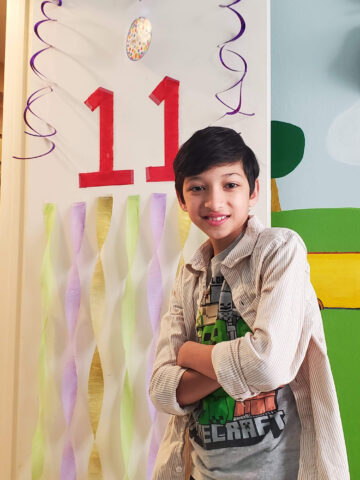About one in 25 children will suffer a febrile seizure, a convulsion induced by fever. Seeing a child endure a seizure is terrifying, but parents can rest assured that febrile seizures are not life-threatening and do not have lasting consequences.
Calm your fears and learn more about febrile seizures from Dr. David Adams, neurologist at the Neuroscience Institute at CHOC.
Signs and symptoms of febrile seizures
They are most seen in children between six months and five years, and they are most common in toddlers 12 to 18 months old. Simple febrile seizures last less than 15 minutes and complex febrile seizures last longer than 15 minutes
“Typically, febrile seizures only last a couple of minutes,” says Dr. Adams. “Overwhelmingly, most kids will turn out fine.”
Most kids who experience febrile seizures have a family history of them.
During a febrile seizure, your child may do the following:
- Have jerking movements.
- Convulse, shake or twitch.
- Moan.
- Become unconscious (pass out).
You know your child best! If you are concerned about your child having a febrile seizure, call your doctor or an on-call nurse hotline. Use CHOC’s Care Guide to help determine the right place for your child to get care.
What to do during your child’s febrile seizure
If you suspect that your child is having a febrile seizure, there are some things you can do to help, says Dr. Adams.
If your child experiences a febrile seizure, use these tips when responding:
- Lay the child on the ground on their side.
- Time the seizure.
- Take the child’s temperature.
- Watch for signs of breathing problems, including bluish color in the face.
Call 911 or visit your nearest emergency department if your child has the following symptoms:
- Has a febrile seizure that lasts longer than 5 minutes.
- The seizure involves only some parts of the body instead of the whole body.
- Has trouble breathing or turns blue.
- Isn’t responding normally.
- Has another seizure within 24 hours.
What to do after your child’s febrile seizure
Following a febrile seizure, your child may be tired, sleepy or irritable. However, they should return to their normal self after a few hours.
“If parents have any concerns, they should contact their pediatrician,” says Dr. Adams.
Frequently asked questions about febrile seizures and kids
Febrile seizures, in general, do not have any lasting effects or permanent damage. Children often do not need to be treated or medicated with anti-epileptic medications.
A febrile seizure is a seizure provoked by a fever. Someone diagnosed with epilepsy has suffered at least two unprovoked seizures in their lifetime. A small portion of children who experience febrile seizures, about 2 percent, may go on to have epilepsy.
There are also people with epilepsy who have never had a febrile seizure. Some children are simply genetically predisposed to suffer febrile seizures. A close examination of a family’s health history usually reveals that a relative previously experienced such seizures.
Boys are slightly more likely to suffer febrile seizures than girls. Across genders, febrile seizures are most likely to occur in children between ages 1 and 4. However, these seizures sometimes can happen to children younger than 12 months old, and up to age 6. Children usually outgrow the condition.
A child may convulse, shake and twitch. Their eyes might also roll back, and they may become limp and unresponsive.
No. Again, some children are simply predisposed to suffering seizures triggered by fever. However, parents can work to treat a fever, the impetus for a febrile seizure. If usual at-home remedies do not help reduce a fever, seek medical attention to rule out a more serious illness.
30% of children who have experienced a febrile seizure will experience another one after. If your child is younger than 12 months old or older than 4 and is experiencing febrile seizures, your pediatrician may refer you to a specialist for a neurology consultation.
Seek a specialist’s help if your child has experienced more than two febrile seizures in a 24-hour period, or has suffered a complex febrile seizure, characterized by seizures affecting one side or one part of the body and lasting longer than 15 to 20 minutes. Genetic testing may also be considered for some kids.
Get more expert health advice delivered to your inbox monthly by subscribing to the KidsHealth newsletter here.
Learn more about CHOC’s Neuroscience Institute
At CHOC, our team of board-certified specialists and neuroscience-trained staff provide a full spectrum of care for disorders of the brain, spine, muscles and nervous system.






